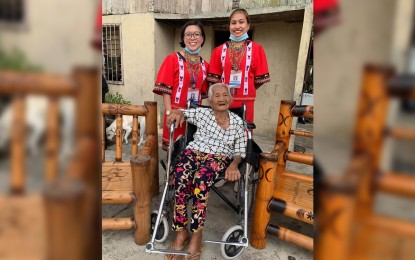
BIRTHDAY GIFT. Officials from the Department of Social Welfare and Development in Region 10 (Northern Mindanao) deliver a PHP100,000 cash incentive to 101-year old Tomasa Manaran on Thursday (July 23, 2020). DSWD-Northern Mindanao has so far distributed cash incentives to 14 centenarians. (Contributed photo from DSWD-10)
MANILA – The Department of Social Welfare and Development (DSWD) said it expects about 952 centenarians to receive PHP100,000 cash benefit from the Philippine government this year.
DSWD, on its website, reported that as of June 15, there are already 289 centenarians who received PHP100,000 each.
“A total of 952 centenarians are expected to benefit from the law this year,” the report said.
From 2016 to 2019, the agency has released PHP560,900,000 for the cash gift of 5,609 centenarians nationwide.
On Thursday, the DSWD field office in Northern Mindanao lauded the local government of Malaybalay City in Bukidnon for providing care and attention to the elderly.
Tomasa Manaran, 101, who lives in Barangay Simaya, Malaybalay City, received her cash gift from social welfare officials who delivered and greeted her on her birthday.
“Sa buong Northern Mindanao Region (10), umaabot na sa 14 na centenarians ang nabigyan ng tulong ng DSWD Field Office 10 (In Northern Mindanao Region, 14 centenarians received cash aid from the DSWD Field Office 10),” the post said.
In a Viber group, DSWD spokesperson Irene Dumlao cited that despite the agency’s busy schedule prioritizing the social amelioration program (SAP) for the poor who were hardest-hit by the public health crisis, other existing programs are still in effect.
“Amid the threat of Covid-19, DSWD has adopted the house-to-house delivery scheme for the centenarian cash gift of Filipino citizens 100 years old and above, as stated under Republic Act 10868 or the Centenarians Act of 2016,” she said.
The agency shifted to house-to-house delivery of cash incentives considering the beneficiaries’ health and physical limitations.
“The scheme is also more convenient for them and their relatives especially that the government encourages seniors to stay at home as part of health and safety protocols,” Dumlao said.
How to avail
Based on DSWD Memorandum Circular No. 4, series of 2017, centenarians are identified by existing databases: local office of senior citizens affairs, social pension, Community Based Monitoring System (CBMS), public and private residential care facilities client inventories and data from the Commission on Filipinos Overseas (CFO).
Relatives of the applicants must submit primary documents such as birth certificates and Philippine passports that are needed to be presented by centenarians during the validation process to their localities.
If the two documents are not available, any one of the primary government-issued Identification Cards (IDs) may be shown such as GSIS and SSS IDs, driver’s license, Professional Regulations Commission (PRC) license, and Comelec voter’s IDs.
If the primary IDs are absent, two of the following secondary documents may be presented: marriage certificates either from the Philippine Statistics Authority or the local civil registrar’s office; birth certificates of the children of the centenarian issued by the Philippine Statistics Authority or the local civil registrar’s office; affidavits from two disinterested persons, aged 80 years who have personal knowledge of the centenarian’s age and birthdate.
School and employment records showing the age of the centenarian, baptismal or confirmation records issued by churches and religious organizations, medical or dental examinations by government or private doctors and dentists, and other related certifications from the National Commission on Muslim Filipinos, National Commission on Indigenous Peoples, AMWSLAI, AFPSLAI, veteran groups and similar organizations may also be accepted as secondary documents. (PNA)
